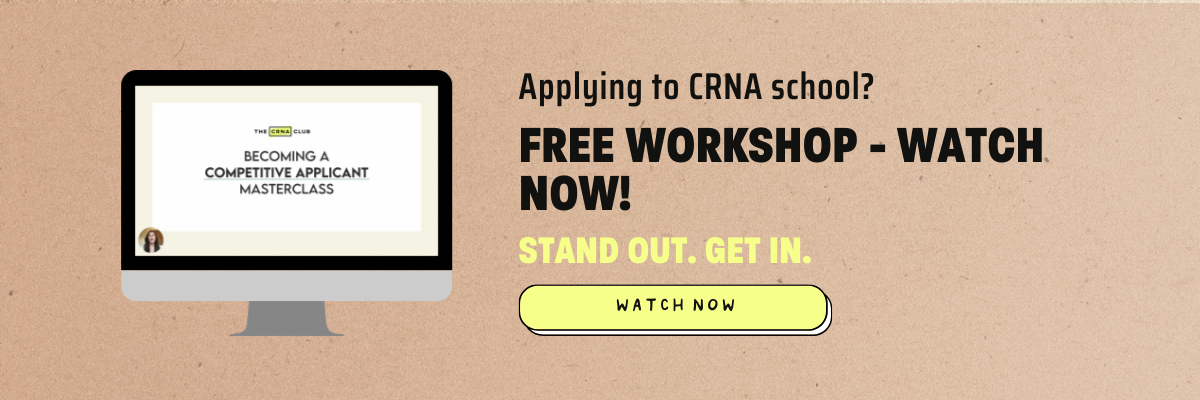Why CRNA School is the Hardest Thing You’ll Ever Do – And How to Conquer It
So when people say “CRNA school is the hardest thing I’ve ever done.” — what do they actually MEAN by that? It’s kind of something you have to live to understand fully. I’m sure social media gives a small glimpse into the day to day life of a nurse anesthesia resident but what actually makes the process so difficult? Here’s just some of the challenges you face (and then conquer 😉) during your time in school.
Mastering Time Management
The first step to mastering any skill is to think of any skill, time management in this case, as something that is malleable and you have the ability to grow in. I can’t tell you how many times people ask me, “how do you find time for all of that, I’m just not good at it.” I am Ghanaian and we are known to be the furthest from timely people 🤣 so I truly believe if *I* can master managing my time better than anyone can.
- PLAN
First start with a good calendar. Google calendar, Notion, even Outlook calendar work fine! I am a huge google calendar person and it's become a staple in my life, if it is not on the calendar, it will NOT be happening. I try to add all school tasks, exams, SIMs and then my personal calendar all in one place so you can clearly see any schedule conflicts.
- EXECUTE
Understand your optimal productivity hours and know they may not be the same as others. I for one am a morning person but tons of my classmates retain and understand information best at night, whichever works best for you is ideal. For the actual day to day, tools such as trello, pomodoro technique, to-do lists and “hard things first” are good to implement.
It helps to break up large tasks into small actionable steps.
- REVIEW & RESET
After any quiz or test I try and review the techniques which I implemented that worked and those which I could change. The difficult part of school is that while you’re still working out the kinks, exams still keep coming. Give yourself the grace and understanding that you are trying and putting in the effort early is what is going to allow you to find the optimal tools personalized to you!
- REST
In the planning don’t forget to put yourself care into the calendar. During didactic I tried to set aside one day a week that was just for me. Whether it was spending time with my partner, seeing my bestie, engaging in a hobby I liked or simply sleeping in and watching Suits reruns – it was my time to do what I enjoyed. This is a marathon and if you don't set aside the rest time you will be forced to rest at some point. Be proactive and not reactive about it!
Giving Yourself Grace Through the Learning
As a former ICU nurse taking care of some of the sickest patients on your unit, after possibly taking the GRE, studying tirelessly for your CCRN and preparing by doing mock interviews. You’ve practiced and prepared and even quit your job to be here. There’s a lot riding on this for your and your family – and then you don’t do as well as you wished on your first exam. The immediate dread sets in and you start to doubt whether you’re actually cut out for this.
Stopping the spiral of not letting yourself become your own worst critic is pivotal to being able to grow through school. There is absolutely a transition of learning how to learn at this high of a volume and being a full time student all over again. The worst thing you can do is start to doubt your abilities or the fact that you belong here in the first place. Cognitive reframing is a concept based in psychology that supports analyzing our thoughts to help adjust our mindset and provide more realistic expectations. It's something I encourage students to look into before starting school because it's pivotal to developing a growth mindset (vs. a fixed mindset) about one’s abilities, especially after failure.
Pivot and think of all the things you have done well. All the successes you've had leading up to this moment and know that that can be built again. As corny as it sounds, being kind to yourself and understanding that you can and will, grow through this is important for your growth. Building a new mindset will take time to develop but practicing daily will translate through all the transitions of school whether didactic or clinical.
Managing Expectations with Loved Ones
One of the largest challenges of CRNA school is that you are still a full time adult while trying to go through school. Depending on your family structure, you may have a significant other, be a dog parent, or even be a single parent.
Explaining to your loved ones that you do not have the availability or capacity to show up in the ways you previously did will be challenging. I advise managing expectations of your time EARLY on so people know what you’re capable of doing. There will still be times where you have to explain that you can’t make it to every dinner party, birthday or trip cause you have to study or you have an exam coming up. But you can use your time management skill of planning and set aside designated time to spend with the people you love. Things like calling after lecture at the same time everyday, recurring date nights after a long clinical week or planning some quality time at the end of finals week, gives you (and them) something to look forward to.
Realize that the people in your life are also adjusting to having their loved one in CRNA school. The life they imagined or previously had with you will be altered, it's important to explain it's a temporary adjustment, and the importance for you to take this time to advance your career. Those who love you will hopefully understand, but in the end this is an investment in yourself and career so you have to be dedicated to this above all.
Most people may not even understand what a CRNA is, so you will be doing lots of explaining through the three years. Have patience with the people in your life as they go through the transition with you. From their perspective not having their partner or friend be as present as they previously were is also challenging.
If you have the support from loved ones to help in your day to day life, to allow you to focus on school, lean into that. And if you’ve moved away for school, I think it's even more important to build a community where you are. Whether it's your classmates or friends you find in the area. Know that you will need someone to vent to, a shoulder to cry on, someone to help you pack and move for clinical at 9pm at night – trying to do things on your own will not serve you.
The Mental Marathon: Balancing Life and School
The challenges of CRNA school are not only found in the physics of anesthesia but in managing the chemistry of your mind and life outside of school. When you find a way to persevere through the mental challenges of school and settle your life outside of being a student, it gives you more capacity to be present for yourself and others. Finding the balance takes time, give yourself grace through the process and know that this is a marathon and not a race. Building skills for longevity is a worthy investment and you are more than capable of doing that!
Wishing you well –
Nali, SRNA
Ready to become a competitive CRNA school applicant? Check out our 30-Minute Masterclass, "Becoming a Competitive CRNA School Applicant." It’s one of our most popular resources and a great place to start!


tune in weekly as we serve up insight into the crna profession, application hot tips and interviewing prep. we dish our juiciest (and best) stuff here.
featured episodes
The One Thing That Will Change Your Entire Application Journey
Making the Most out of Your Year in the ICU
What Should You Really Care About When Choosing a CRNA School?
Your Secret Weapon When Applying to CRNA School